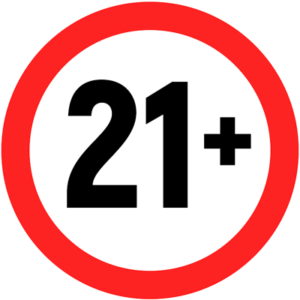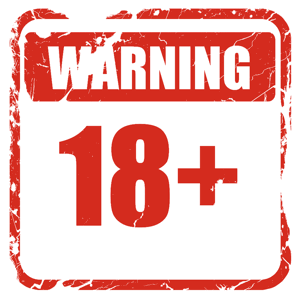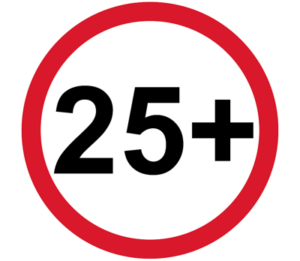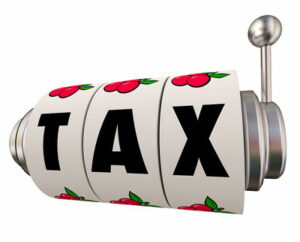 In the United Kingdom, the minimum age for gambling is 18. For a time, National Lottery players could buy tickets and scratch cards at the age of 16, that was raised to 18 to come in line with other forms of gambling in April of 2021.
In the United Kingdom, the minimum age for gambling is 18. For a time, National Lottery players could buy tickets and scratch cards at the age of 16, that was raised to 18 to come in line with other forms of gambling in April of 2021.
For some, that was a raise of the age that was enough. For others, however, there is a belief that the UK would do well to learn from the United States of America, where the legal age for gambling in most states is 21. Do the Americans have it right when it comes to their gambling age? Or are we becoming too much of a nanny state?
On the one hand, there is the argument that people should be allowed to make their own mistakes and have autonomy on their choices. You could start a family at the age of 16 but you aren’t allowed to place a bet on a football match for two more years. If we extended that further to five years, is that not control gone mad?
On the other hand, it is definitely the case that gambling can lead to all sorts of harm and get people into financial trouble if they can’t control their habits, so stopping people from being able to do that at a young age seems like a sensible move to make.
The Current Law
| Activity | Minimum Age | Section of 2005 Act |
|---|---|---|
| Casino Gambling | 18 | 46, 47, 48, 49 |
| Other Licensed Gambling Premises | 18 | 46, 47, 48, 49 |
| Category A, B1, B2, B3, B3A, B4, C Gaming Machines | 18 | 47, 48 |
| National Lottery | 18 | 48 (2)(c) |
| Scratchcards | 18 | 48 (2)(c) |
| Football Pools | 16 | 48 (2)(d) |
| Category D Gaming Machines | None | 46 (2)(e), 48 (2)(e) |
| Private or Non-Commercial Betting & Gaming | None | 48 (2)(f), 48 (2)(g) |
| Equal chance gaming in accordance with a prize gaming permit / Equal chance gaming at a licensed family entertainment centre | None | 48 (2)(f), 48 (2)(g) |
| Prize gaming at a non-licensed family entertainment centre / Prize gaming at a travelling fair | None | 48 (2)(h), 48 (2)(i) |
At the time of writing, the Gambling Act of 2005 is what dictates the age of players of various gambling related activities in the United Kingdom. The table above looks at how they work.
A quick look at that makes one thing standout above the others: the fact that 16-year-olds are allowed to play the football pools. What is it about the football pools that makes it different from, say, the National Lottery?
Why is it felt that someone aged 16 can handle themselves doing that but wouldn’t be able to control their urges when choosing six numbers that might win the lottery? It is, as with most age limits, an entirely arbitrary choice that bleeds into the argument that younger people make that there is no rhyme or reason why they are allowed to bet on some things but not on others.
What The Age Is In Other Countries
| Country | Minimum Age | Details |
|---|---|---|
| New Zealand | 18 / 20 | It is 18 for horse racing and ‘instant kiwi’, but 20 for casino betting and no limit on other gambling types including the lottery |
| Belgium | 18 / 21 | In Belgium, the legal age for the national lottery is 18, whilst it’s 21 in casinos |
| Estonia | 18 / 21 | The legal age to buy lottery tickets in Estonia is 18, whilst it’s 21 in casinos |
| Greece | 23 | |
| Georgia | 18 / 25 | The legal age for gambling in Georgia is 25, but foreign citizens and ‘stateless persons’ can gamble if they’re 18 or over |
| Malta | 18 / 25 | Similar rules to Georgia exist in Malta, where the legal age for gambling is 25 for Maltese citizens and 18 for everyone else |
| Portugal | 18 / 25 | The laws around gambling are complicated in Portugal. Each casino has its own rules, with some allowing tourists to gamble if they’re 18 and locals if they’re 25 |
| Sweden | 18 / 20 | In Sweden, you can only gamble in casinos if you’re 20 or older, whilst other forms of gambling can take place as long as you’re 18 or over |
| Armenia | 21 | |
| India | 21 | |
| Japan | 18 / 20 | For most gambling in Japan you can do it if you’re 18, but casinos and lotteries are restricted to those aged 20 and up |
| Lebanon | 21 | |
| Macau | 18 / 21 | In something of a reversal to other locations, lottery, sports betting and racing wagering can be done if you’re 18, with other forms of gambling restricted to those aged 21 and over |
| Malaysia | 21 | Gambling is illegal for Muslims in Malaysia |
| Phillipines | 18 / 21 | The lottery can be played if you’re 18 in the Philippines, but the casinos are limited to those aged 21 and over |
| Singapore | 18 / 21 | Sports betting, racing and lotteries can all be played if you’re 18 in Singapore, whilst casinos are for those aged 21 and above |
| South Korea | 19 | |
| Taiwan | 20 | |
| Thailand | 20 | It is illegal to gamble in Thailand, apart from playing the state lottery, which is open to those aged 20 and over |
| Vietnam | 21 | |
| Cote d’Ivoire | 21 | |
| Egypt | 21 | |
| Namibia | 21 | |
| Niger | 18 / 21 | Some casinos are open to those aged 18, whilst most are limited to people aged 21 and above. Other forms of gambling are fine if you’re 18 or over |
| Nigeria | 20 | |
| Canada | 18 / 19 | The casinos and lotteries in Canada are limited to either 18 or 19-year-olds depending on the part of Canada that you’re in |
| Dominican Republic | 13 | |
| Saint Kitts & Nevis | 21 | |
| US Virgin Islands | 18 / 21 | You need to be 21 to gamble in a casino on the US Virgin Islands, but other forms of gambling are open to 18-year-olds and over |
| United States of America | 18 / 19 / 21 | Varies by state |
The next obvious question to ask when considering what the legal age for gambling should or shouldn’t be is what it is in other countries. Rather than look at every single other country in the world that allows gambling, it makes more sense to have a look at those that have a legal age for gambling that is different from the 18 that is the minimum age in the United Kingdom at the time of writing.
Obviously we have missed off the countries that have outlawed gambling and the list above might not be exhaustive, but it certainly gives you a sense of the manner in which different countries around the world handle gambling as a subject. The most standout country is unquestionably the Dominican Republic, where the minimum age for gambling stands at 13; the youngest anywhere in the world according to our research.
What Does That Tell Us?
 Of all of the countries in the world that allow gambling, 30 of them have a legal age for at least some sort of gambling activity that is over 18. Of those 30, only 13 have an age that is 21 or older for all forms of gambling.
Of all of the countries in the world that allow gambling, 30 of them have a legal age for at least some sort of gambling activity that is over 18. Of those 30, only 13 have an age that is 21 or older for all forms of gambling.
In other words, there is some trust given to people to be able to place bets on some things at an age that is younger than 21 in 17 countries, with restrictions placed on only certain activities. Were the United Kingdom to increase the legal age for gambling from 18 to 21, the country would be joining the likes of Vietnam, Malaysia and Armenia in being so strict.
That, of course, doesn’t mean that it shouldn’t happen. There is nothing inherently ‘better’ about the UK than there is Vietnam, for example. It is just that those countries tend to be thought of as being much stricter in their approach to numerous things that the United Kingdom is.
As a result, we’d be aligning ourselves with nations that tend to have less trust in their citizens than is commonly thought of as being the case for us. Is that right? Is it far that we should be given less trust in general in the UK than we are currently given by whichever government is in power at the time?
What The Research Says
 There is research that points towards underage gamblers being more likely to develop gambling problems by a power of between two and four times that of those that are aged 18 and above. Even with this taken into account, though, we don’t know why it is that the football pools are viewed as being less likely to lead to addictive behaviour than the National Lottery, as an example.
There is research that points towards underage gamblers being more likely to develop gambling problems by a power of between two and four times that of those that are aged 18 and above. Even with this taken into account, though, we don’t know why it is that the football pools are viewed as being less likely to lead to addictive behaviour than the National Lottery, as an example.
For those that would like to see the minimum age raised the reason why is a simple one: if it stops even one person from developing a gambling problem then it was worth making the change.
It is also important to understand the brain of a teenager. By that we don’t mean that they’ll be thinking about porn and video games. Rather, it is an acknowledgement of the fact that the brain is not properly developed when someone is in their teens.
Interesting, though, work done by the University of Rochester suggests that the rational part of the human brain isn’t fully developed until you reach the age of 25. If you’re using research to suggest that the legal age for gambling should be raised, why is it that 21 is the age at which people have decided we’re adult enough?
Becoming Too Much Of A Nanny State?
 For a lot of people, the influence of the state is already too much. There is a sense that we are losing our ability to make our own choices, being told when we can drink, the age at which we’re allowed to have sex and, potentially, when we can gamble.
For a lot of people, the influence of the state is already too much. There is a sense that we are losing our ability to make our own choices, being told when we can drink, the age at which we’re allowed to have sex and, potentially, when we can gamble.
As citizens of the United Kingdom, shouldn’t we be given more freedom rather than less? Whilst it is certainly the case that some people will struggle to control their impulses when they’re young, the same is true of older people. Someone aged 15 would know to stop when they’re ahead just as someone aged 30 might not.
It is impossible to control everything that people do. Whilst that doesn’t mean that we just shouldn’t bother in the first place, what it does mean is that we have to be sensible in our approach to certain things.
If you were suddenly to raise the gambling age from 18 to 21, many would ask why it is that you’re allowed to start a family at 16, drive a car that could kill people a year later but wouldn’t be allowed to place a bet on a football match between Liverpool and Manchester United for a further four years. It is control that has gone too far in the eyes of many.
It Would Come At A Cost
 There is one other factor that the powers that be would need to think about when deciding whether or not to increase the gambling age from 18 to 21: the cost. Whilst it is cynical to have a discussion about money that is brought in from gambling taxes, it is also a reality that the party in power has to think about.
There is one other factor that the powers that be would need to think about when deciding whether or not to increase the gambling age from 18 to 21: the cost. Whilst it is cynical to have a discussion about money that is brought in from gambling taxes, it is also a reality that the party in power has to think about.
Should you make a move to increase the legal gambling age you are, by the very decision, removing a huge swathe of people who would spend money on the activity. This would then result in much less money being made by the companies that pay UK tax.
Less money through taxing gambling companies means that the money would need to be found from somewhere else. Other forms of tax would increase, hitting people’s pay packet and causing a degree of unrest within the citizens of the country.
This, in turn, would mean that the party that made the decision would almost certainly lose the next election. The flapping of a butterfly’s wings over one topic would cause damage in other areas that would make it extremely unlikely to happen. It might be good for a few people to stop them from being able to gamble so young, but it might be bad news for the many as a result.